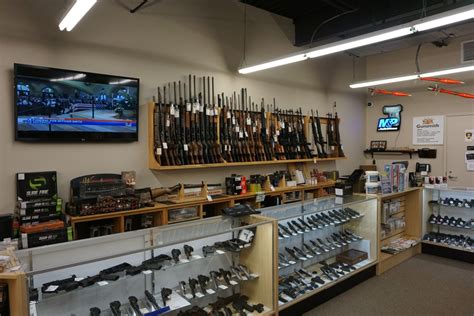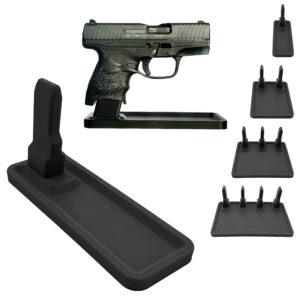
Categories:
Compliance for Federal Guns License (FFL) holders is central to the responsible operation of businesses that deal in guns in the United States. As a cornerstone of federal regulations overseen by the Bureau of Alcohol, Tobacco, Guns and Explosives (ATF), these requirements are pivotal in ensuring that guns are sold, transferred, and stored in a manner that aligns with legal and safety guidelines.
Understanding and adhering to these compliance measures is essential not only for the legal functionality of the business but also for the wider assurance of public safety.
FFL holders, whether large commercial enterprises or small independent sellers, must navigate a landscape of meticulous record-keeping, proper transaction documentation, periodic inspections, and adherence to state and federal laws that govern the sale of guns. Compliance begins with acquiring the license itself, an intricate process that involves thorough background checks and clear demonstration of business premises for secure storage. Post-licensure, the obligations continue with the meticulous maintenance of the Acquisition and Disposition (A&D) records, which detail every gun acquired and sold by the licensee.
These records must be kept up to date and accurately reflect the status and movement of inventory.
Simultaneously, FFL holders must conduct background checks for all potential buyers, a procedure facilitated through the National Instant Criminal Background Check System (NICS). This process ensures that guns are not sold to individuals prohibited by law, such as those with certain criminal convictions or adjudicated mental health issues. FFL holders must also be prepared for periodic audits by ATF agents, who assess compliance with federal regulations and verify the accuracy of record-keeping.
Beyond federal mandates, compliance often entails a complex interaction with state laws, which can impose additional requirements on gun transactions. Thus, FFL holders must remain informed about changes to both state and federal legislation, ensuring that their practices remain aligned with the evolving legal landscape. In essence, compliance for FFL holders is a continuous commitment to lawful and ethical business operations, pivotal in fostering a culture of responsibility and safety within the guns industry.
Federal Guns License (FFL) holders operate under a complex and stringent set of regulations designed to ensure gun transactions and related activities are conducted legally and safely. Understanding these federal regulations is crucial for FFL holders to remain compliant and to contribute to the broader goal of reducing unlawful gun distribution. The primary source of regulations governing FFL holders is the Gun Control Act (GCA) of 1968, which established a comprehensive framework for the sale and distribution of guns in the United States.
Under the GCA, FFL holders are required to conduct background checks on prospective gun purchasers to ensure they are eligible to own guns. This involves using the National Instant Criminal Background Check System (NICS) to identify any disqualifying factors, such as felony convictions or mental health prohibitions.
Additionally, FFL holders must maintain meticulous records of all gun transactions, including acquisition and disposition logs. These records are subject to inspection by the Bureau of Alcohol, Tobacco, Guns and Explosives (ATF) to ensure compliance with federal laws. Regular inspections by the ATF aim to verify that FFL holders are adhering to all applicable regulations, and any discrepancies may result in fines, revocation of the license, or legal action.
It is also important for FFL holders to be familiar with state and local laws, as these can impose additional requirements beyond the federal regulations.
Moreover, FFL holders must be vigilant about storage and security requirements to prevent unauthorized access or theft of guns. Proper storage protocols are crucial not just for compliance, but for public safety, as they help prevent guns from getting into the hands of those who intend to use them unlawfully. Staying informed about changes in regulations, whether through legal counsel or industry associations, is crucial for ongoing compliance.
By thoroughly understanding and adhering to federal guns regulations, FFL holders play a vital role in promoting responsible gun ownership and distribution, thereby enhancing public safety and trust in the guns industry.
Obtaining a Federal Guns License (FFL) requires adherence to specific licensing requirements and a comprehensive application process as mandated by the Bureau of Alcohol, Tobacco, Guns and Explosives (ATF). To begin, individuals or businesses must determine the type of FFL that aligns with their intended operations, whether it is manufacturing, dealing, or importing guns. Each type of FFL comes with its own set of requirements and responsibilities, and selecting the appropriate one is crucial for compliance.
Applicants must be at least 21 years of age and legally eligible to possess guns and ammunition, ensuring they have no disqualifying criminal backgrounds or prohibitions.
Before applying, it is essential for applicants to familiarize themselves with all relevant federal, state, and local regulations, as compliance with local laws is an integral part of the licensing process. They need to verify zoning laws to ensure that their premises, whether a personal residence or a commercial space, can be used for conducting guns-related business. Additionally, applicants must have secured a legal business entity, usually through the Secretary of State, if they are applying as a business.
The application process itself involves completing ATF Form 7, which requires providing detailed information about the applicant, including personal identification details, the type of business entity, and specifics about the business premises. This form must be submitted along with the appropriate application fee, which varies depending on the type of license. Following submission, the ATF conducts a thorough background check on the applicant and performs an in-person interview to ensure understanding of legal obligations and responsibilities associated with holding an FFL.
Additionally, the ATF will inspect the proposed business premises to confirm compliance with all physical security standards required for safeguarding guns. This includes verifying the effective storage of guns to prevent theft or unauthorized access. Once all the steps are completed satisfactorily, and the ATF approves the application, the FFL is granted. Compliance with ongoing requirements remains critical, as the ATF conducts periodic inspections to ensure that FFL holders continue to adhere to all relevant laws and regulations.
Compliance for Federal Guns License (FFL) holders is a critical responsibility, particularly in the realm of record keeping and reporting obligations. These duties are fundamental to ensuring adherence to legal requirements and maintaining the integrity of the guns industry. One of the primary responsibilities under these obligations is the meticulous maintenance of the Acquisition and Disposition (A&D) record, often referred to as the “bound book.”
This record includes comprehensive details of every gun acquired and disposed of in the course of commerce, including the model, serial number, type, and caliber, along with pertinent dates and the particulars of the transaction parties. Accurate and up-to-date information in this record is essential not only for compliance during routine inspections by the Bureau of Alcohol, Tobacco, Guns and Explosives (ATF) but also for effective inventory management and traceability in case of theft or criminal investigation.
In addition to the bound book, FFL holders must ensure that ATF Form 4473, the Guns Transaction Record, is accurately completed for each guns sale or transfer. The form documents the buyer’s eligibility and helps prevent the unlawful acquisition of guns by individuals prohibited from possessing them. This form must be retained for at least 20 years and made available for inspection by the ATF.
Besides ongoing record maintenance, FFL holders are also tasked with specific reporting duties. If a gun is lost or stolen, an FFL holder must report the incident directly to the ATF and local law enforcement within 48 hours of discovery. Furthermore, multiple handgun sales or dispositions to a single individual within a five consecutive business day period necessitate a special report to both the ATF and local law enforcement.
These reporting requirements are crucial for promoting legal commerce and thwarting illegal activities.
In essence, diligent record keeping and timely reporting are integral to maintaining an FFL. Adhering to these obligations not only facilitates compliance with federal regulations but also supports broader public safety efforts by ensuring that guns remain in the hands of lawful and responsible users.
Conducting background checks and facilitating transfers are pivotal aspects of compliance for Federal Guns License (FFL) holders. The Brady Handgun Violence Prevention Act mandates that FFL holders conduct background checks on individuals purchasing guns, a practice seen as essential for ensuring public safety and responsible gun ownership. This process typically involves the use of the National Instant Criminal Background Check System (NICS), which helps determine if a prospective buyer is eligible to purchase guns.
FFL holders are required to access NICS, either directly or through designated state points of contact, to perform these checks during every transaction unless an exemption applies, such as a guns transfer between licensed dealers or the buyer possessing a valid permit that waives the need for a NICS check.
The accuracy and reliability of background checks depend significantly on the precise and diligent processing of information by FFL holders. They are responsible for collecting accurate personal data, including the buyer’s full name, address, and identification details, and ensuring these are correctly entered into the system. In addition, they must maintain accurate records of each transaction, which involves filling out the ATF Form 4473 correctly and maintaining this documentation for a minimum of 20 years.
Consistent record-keeping helps in audits and inspections by the Bureau of Alcohol, Tobacco, Guns and Explosives (ATF), ensuring ongoing compliance with federal regulations.
Transfer procedures are another critical component, involving the handover of guns only after completion and approval of the background check. If the NICS background check results in a “proceed” response, the FFL holder can complete the transaction. However, should a “delay” response occur, the FFL must wait for further instruction, and if it results in a “deny,” the transaction must be halted entirely.
Importantly, FFL holders should maintain an up-to-date understanding of both federal and state laws, as these can govern specific waiting periods or additional requirements, influencing how transfers and background checks are conducted. Adhering to these protocols ensures that FFL holders remain compliant, avoid penalties, and contribute to the safe and responsible circulation of guns.
Federal Guns License (FFL) holders must navigate various regulatory requirements, and one of the most critical components is inspections and audits conducted by the Bureau of Alcohol, Tobacco, Guns and Explosives (ATF). These inspections are essential for ensuring that FFL holders comply with federal guns laws as outlined in the Gun Control Act of 1968. ATF inspections serve several purposes, one being to verify that FFL holders accurately maintain records of gun acquisitions and dispositions, as this documentation is crucial for tracing guns involved in criminal activities and for maintaining public safety.
Typically, an FFL holder can expect the ATF to conduct an inspection once a year, although it may occur less frequently if the results of past inspections have been satisfactory. During an inspection, ATF agents assess whether the FFL holder is operating their business in compliance with all applicable laws. This includes ensuring that proper background checks are conducted prior to gun sales, that required records are accurately completed and stored, and that guns are secured appropriately to prevent unauthorized access.
FFL holders should be ready to provide ATF agents with access to records, inventory logs, and the physical premises where the guns are stored or sold.
An essential aspect of these inspections is the “bound book,” a comprehensive log where FFL holders must record every gun transaction. The agents verify the accuracy and completeness of these entries, comparing them against physical inventory and sales records. Any discrepancies discovered during the inspection could signal potential issues with compliance, prompting further inquiry or corrective measures.
While the process may seem daunting, routine inspections aim to foster a cooperative relationship with FFL holders by offering guidance and solutions for compliance. Should any breaches of compliance be identified, the ATF may issue warnings, and if severe violations are found, they could lead to fines or the revocation of the FFL. For many FFL holders, successfully passing an ATF inspection is a testament to their commitment to lawful business practices and the overall safety and integrity of the guns community.
Maintaining compliance as a Federal Guns License (FFL) holder is crucial for both legal and ethical reasons, ensuring that guns are distributed responsibly while adhering to federal, state, and local regulations. To achieve and maintain compliance, FFL holders should develop a comprehensive approach that systematically addresses all aspects of guns sales and transfers. First and foremost, it is essential to maintain meticulous records of all transactions.
This includes conducting thorough background checks and ensuring all forms, particularly the ATF Form 4473, are accurately completed and stored. Record keeping should be seen not just as a regulatory requirement but as a cornerstone of operational integrity. Regular internal audits can help identify potential discrepancies or areas where procedural improvements are needed, allowing for timely corrections that prevent minor issues from escalating into compliance violations.
Staying informed about regulatory changes is another critical best practice. Regulations governing guns are subject to change, so FFL holders should be proactive in educating themselves and their staff about any new laws or amendments. This can be achieved through subscriptions to industry publications, participation in relevant training sessions or webinars, and engagement with trade associations that provide updates and guidance.
Training employees is equally important. Comprehensive training programs that cover not only the technical aspects of guns handling but also the legal responsibilities and ethical considerations are vital for ensuring compliance across the board.
Moreover, maintaining a clear and open line of communication with the Bureau of Alcohol, Tobacco, Guns and Explosives (ATF) can be a valuable asset. Whether seeking clarification on a regulation or reporting a potential issue, engaging with the ATF proactively demonstrates a commitment to compliance and may avert misunderstandings that could lead to penalties. Ultimately, fostering a culture of compliance within the business will ensure that everyone involved understands the importance of adhering to regulations and the role they play in sustaining a lawful and reputable operation.








Colt
Colt M4 Carbine
Colt LE6920
Colt AR-15 A4
Daniel Defense
DDM4 V7
DDM4 V9
DDM4 V11
DDM4 ISR (Integrally Suppressed Rifle)
Smith & Wesson (S&W)
M&P15 Sport II
M&P15 Tactical
M&P15T
Bravo Company Manufacturing (BCM)
BCM Recce-16
BCM Recce-14
BCM MCMR Series
Aero Precision
M4E1 Series
AC-15
AR15 Pistol (Various Configurations)
Ruger
Ruger AR-556
Ruger SR-556
Ruger AR-556 MPR (Multi-Purpose Rifle)
Springfield Armory
Saint Victor
Saint Edge
Saint AR-15
PSA (Palmetto State Armory)
PSA PA-15
PSA AR-V
PSA Jakl (AR Pistol)
FN America
FN 15 Tactical Carbine
FN 15 Patrol
FN 15 DMR
Wilson Combat
Recon Tactical
Super Sniper
Protector Carbine
SIG Sauer
SIG M400 Tread
SIG M400 Elite
SIG M400 SDI
LWRC International
IC DI (Direct Impingement)
IC SPR
IC A5
Bushmaster Guns
XM-15 QRC
Bushmaster MOE
XM-15 Patrolman
Rock River Arms
LAR-15 Entry Tactical
LAR-15 Predator
LAR-15 Elite Comp
Stag Arms
Stag 15 Tactical
Stag 15L (Left-Handed Models)
Stag 15 Valkyrie
Noveske Rifleworks
Noveske Gen 4 N4
Noveske Space Invader (AR Pistol)
Noveske Recon
Anderson Manufacturing
AM-15 Optic Ready
AM-15 M4 Carbine
AM-15 Precision Rifle
Adams Arms
AA-15 Piston Rifle
P2 AARS (Adams Arms Rifle Series)
Black Rain Ordnance
SPEC15 Series
BRO Predator
Fallout 15
Diamondback Guns
DB15 Series
DB15CCMLB
DB15EB
Del-Ton Inc.
DTI-15
Del-Ton Echo 316H
Sierra 316M
Windham Weaponry
Windham SRC
Windham VEX-SS
Windham RMCS-4 (Caliber Conversion System)
Christensen Arms
CA-15 G2
CA-15 Recon
CA-15 Titanium Edition
Patriot Ordnance Factory (POF-USA)
Renegade Plus
P415 Edge
Revolution DI
LaRue Tactical
PredatAR
OBR (Optimized Battle Rifle)
LaRue Stealth 2.0
Battle Arms Development
Workhorse Patrol Carbine
BAD556-LW (Lightweight)
Authority Elite Rifle
Faxon Guns
Ascent AR-15
FX-19 (AR Pistol)
Streamline Ultralight Series
KE Arms
KE-15 SLT (Super Lightweight Tactical)
KE-15 Scout Carbine
Primary Weapons Systems (PWS)
MK1 MOD 2-M
MK116 PRO
MK107 (Piston AR Pistol)
ZEV Technologies
ZEV Core Elite Rifle
ZEV AR15 Billet Rifles
Franklin Armory
BFSIII AR-C1
Militia Model
F17-L (Chambered in .17 WSM)
Seekins Precision
SP15 DMR
NX15 Skeletonized Rifle
Havak Bravo
Aero Precision (Additional Models)
EPC-9 (Pistol Caliber ARs)
VG6 AR Rifles
Barrett Guns
REC7 DI
REC7 Gen II
CMMG
MK4 RCE
Resolute 300
Banshee (AR Pistol)
DPMS Panther Arms
Panther Oracle
Panther LR-308
H&K (Heckler & Koch)
HK MR556A1
HK416 (Military Variant)
Rock Island Armory (Armscor)
VR-80 Tactical AR (Shotgun AR Platform)
Troy Industries
Troy SPC-A3
Troy PAR (Pump Action AR)
Wilson Tactical
Tactical Recon AR
Protector Series
F1 Guns
FDR-15 Skeletonized Rifle
BDRx-15 Series
Juggernaut Tactical
JT-15
JT-10 Precision Rifle
AeroSurplus
Surplus AR-15 Rifles (Budget Models)
Thunder Tactical
AR-15 Basic Carbine
Tactical Builder Sets
Radical Guns
RF-15
Forged AR-Series
Dark Storm Industries
DS-15 Featureless Rifles
DS-10 Typhoon
DRD Tactical
Paratus
Aptus AR Rifles
Bear Creek Arsenal
BCA-15
AR Complete Upper Builds
Aero Survival Rifles (ASI)
ASR Tactical Series
Tactical Edge
WARFIGHTER Series
AR-15 Lightweight Rifles
Lone Star Armory
TX15 DMR
TX15 Carbine
HERA Arms
HERA H7
HERA AR-15 Lower Builds
IWI (Israeli Weapon Industries)
Zion-15
DRD Tactical
Tactical Modular Rifles
Quick-Takedown Rifles
V Seven Weapons
1776 Rifle
Hyperlite Rifle
Core Rifle Systems
Core15 Tac III
Core15 Patrol Rifle
Armalite (Original AR-15 Creator)
M15 Tactical
M15 A4 Carbine
DEF15 (Defensive Sporting Rifle Series)
PSA (Palmetto State Armory Additional Models)
PSAK-47 Hybrid (AR-AK Style Hybrid)
PSA Dagger (Pistol Caliber Configurations)
Odin Works
OTR-15
Odin Recon Rifle
Maxim Defense
MDX-508 PDX (Compact AR Pistol)
MDX-510 Rifle